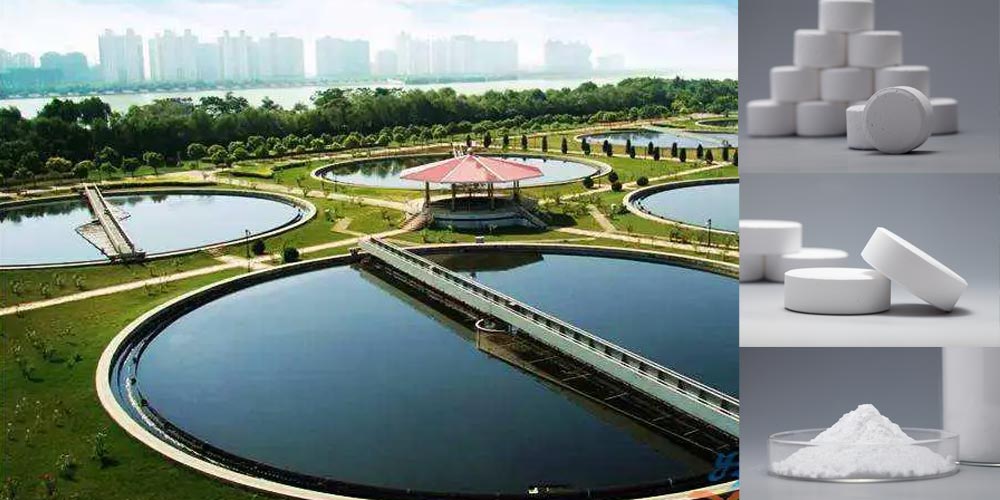Trichloroisocyanuric Acid (TCCA) cov tshuaj chlorine siv dav dav ua cov tshuaj tua kab mob muaj zog hauv cov ntawv thov xws li pas dej da dej, kev kho dej haus, thiab kev ntxuav qhov chaw. Nrog lawv cov khoom tso tawm chlorine muaj zog, lawv kuj raug txiav txim siab rau kev tua kab mob dej phwj thiab dej khib nyiab. Tab sis TCCA puas muaj kev nyab xeeb thiab ua tau zoo hauv qhov no? Cia peb tshawb nrhiav cov txiaj ntsig, kev txhawj xeeb txog kev nyab xeeb, thiab cov kev coj ua zoo tshaj plaws rau kev siv TCCA hauv kev kho dej phwj.
Kev Ua Haujlwm Zoo ntawm TCCA hauv Kev Kho Dej Phwj Tuaj
Cov ntsiav tshuaj TCCAmuaj txiaj ntsig zoo heev rau kev tua cov kab mob pathogens, bacteria, viruses, algae, thiab lwm yam kab mob me me uas feem ntau pom muaj nyob rau hauv cov dej phwj tsis tau kho. Thaum ntxiv rau hauv cov dej phwj, TCCA tso tawm chlorine qeeb qeeb thiab ruaj khov, ua kom muaj kev tua kab mob tas mus li. Cov khoom no pab:
Txo cov kab mob me me
Tiv thaiv kev kis tus kab mob hauv dej
Txhim kho qhov zoo ntawm cov dej khib nyiab uas tau kho kom zoo rau kev tso tawm lossis rov siv dua.
Nws cov tshuaj chlorine tso tawm tas li ua rau TCCA tsim nyog rau kev tua kab mob mus sij hawm ntev hauv cov nroog, kev lag luam, thiab cov dej phwj thaum muaj xwm txheej ceev.
Cov Kev Xav Txog Kev Nyab Xeeb Tseem Ceeb ntawm TCCA
1. Kev Ruaj Ntseg Tshuaj thiab Kev Tso Chlorine Tswj Tau
TCCA yog ib qho khoom ruaj khov, khov kho uas yaj qeeb qeeb hauv dej, tso tawm chlorine dhau sijhawm. Qhov kev tso tawm tswj tau no:
Txo qhov xav tau kev noj tshuaj ntau zaus
Ua kom muaj kev tua kab mob zoo rau lub sijhawm ntev
Txawm li cas los xij, kev noj tshuaj ntau dhau tuaj yeem ua rau muaj cov tshuaj chlorine ntau dhau, uas yuav ua rau lub tshuab kho dej phwj tuaj thiab ib puag ncig puas tsuaj. Kev noj tshuaj thiab kev saib xyuas zoo yog qhov tseem ceeb.
2. Kev Cuam Tshuam Rau Cov Txheej Txheem Kho Mob Los Ntawm Tshuaj Lom
Ntau lub chaw kho dej phwj tuaj yeem siv cov txheej txheem aerobic lossis anaerobic biological, qhov twg cov kab mob me me rhuav tshem cov organic matter. Cov chlorine ntau dhau los ntawm TCCA tuaj yeem tua tsis yog cov kab mob phem xwb tab sis kuj tua cov kab mob zoo no, cuam tshuam kev kho kom zoo. Yuav kom tsis txhob muaj qhov no:
TCCA yuav tsum tsuas yog siv rau theem kawg ntawm kev tua kab mob xwb, tsis yog thaum lub sijhawm kho mob biological.
Cov tshuaj chlorine seem yuav tsum tau kuaj xyuas tas li thiab tswj kom tsis pub dhau qhov txwv kev nyab xeeb.
3. Kev Txhawj Xeeb Txog Ib Puag Ncig
Kev tso cov dej khib nyiab uas muaj chlorine tawm mus rau hauv cov ecosystem ntuj yam tsis tau kho kom zoo tuaj yeem ua rau cov tsiaj hauv dej puas tsuaj. Cov khoom seem ntawm TCCA, xws li:
Cov Trihalomethanes (THMs)
Cov tshuaj Chloramine
muaj tshuaj lom rau ntses thiab lwm yam tsiaj txhu hauv dej, txawm tias muaj me me xwb los xij. Yuav kom tiv thaiv kev puas tsuaj rau ib puag ncig:
Yuav tsum siv cov txheej txheem dechlorination (piv txwv li, sodium bisulfite, activated carbon) ua ntej tso cov dej khib nyiab tawm.
Kev ua raws li cov cai tswjfwm kev tso tawm hauv zos thiab thoob ntiaj teb yog qhov tseem ceeb heev.
Kev Tswj Xyuas Kom Muaj Kev Nyab XeebCov Tshuaj Chlorine TCCA
TCCA suav tias muaj kev nyab xeeb rau kev siv nrog kev ceev faj kom zoo, suav nrog:
Hnav cov hnab looj tes, cov tsom iav, thiab cov khaub ncaws tiv thaiv
Tsis txhob kov daim tawv nqaij lossis qhov muag ncaj qha
Khaws cov ntsiav tshuaj rau hauv qhov chaw txias, qhuav, thiab muaj cua nkag tau zoo, deb ntawm cov khoom siv organic thiab cov tshuaj txo qis.
Kev khaws cia tsis raug lossis kev sib xyaw nrog cov tshuaj tsis sib xws yuav ua rau muaj hluav taws, tawg, lossis tso tawm cov pa phem.
Kev Ua Raws Cai
Ua ntej siv TCCA hauv cov kav dej phwj tuaj, xyuas kom meej tias nws daim ntawv thov ua tau raws li:
Cov qauv kev tiv thaiv ib puag ncig hauv tebchaws thiab cheeb tsam
Cov cai tswjfwm kev kho dej khib nyiab
Cov lus qhia txog kev nyab xeeb hauv kev ua haujlwm
Cov tub ceev xwm feem ntau teem cov kev txwv rau cov tshuaj chlorine dawb thiab tag nrho hauv cov dej khib nyiab uas tau kho. Kev saib xyuas thiab kev sau ntawv pab ua kom ntseeg tau tias ua raws li txoj cai thiab txo cov kev pheej hmoo ntawm ib puag ncig.
Cov tshuaj chlorine TCCA tuaj yeem yog ib qho kev daws teeb meem zoo thiab ua tau zoo rau kev tua kab mob hauv cov dej phwj thaum siv kom raug. Lawv muab kev tswj hwm cov kab mob me me, txhim kho kev nyab xeeb ntawm cov dej khib nyiab, thiab txhawb nqa kev noj qab haus huv pej xeem. Txawm li cas los xij, kev siv kom muaj kev nyab xeeb yuav tsum muaj:
Kev tswj hwm kev noj tshuaj
Kev saib xyuas cov tshuaj chlorine
Kev tiv thaiv cov txheej txheem kho mob biological
Kev ceev faj ib puag ncig
Thaum tswj hwm kom zoo thiab raws li cov lus qhia ntawm txoj cai, TCCA muab txoj hauv kev nyab xeeb thiab zoo rau kev txhim kho cov txheej txheem kho dej phwj tuaj.
Lub sijhawm tshaj tawm: Tsib Hlis-29-2024


